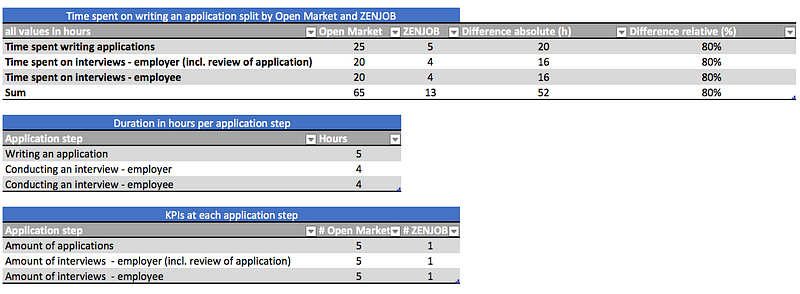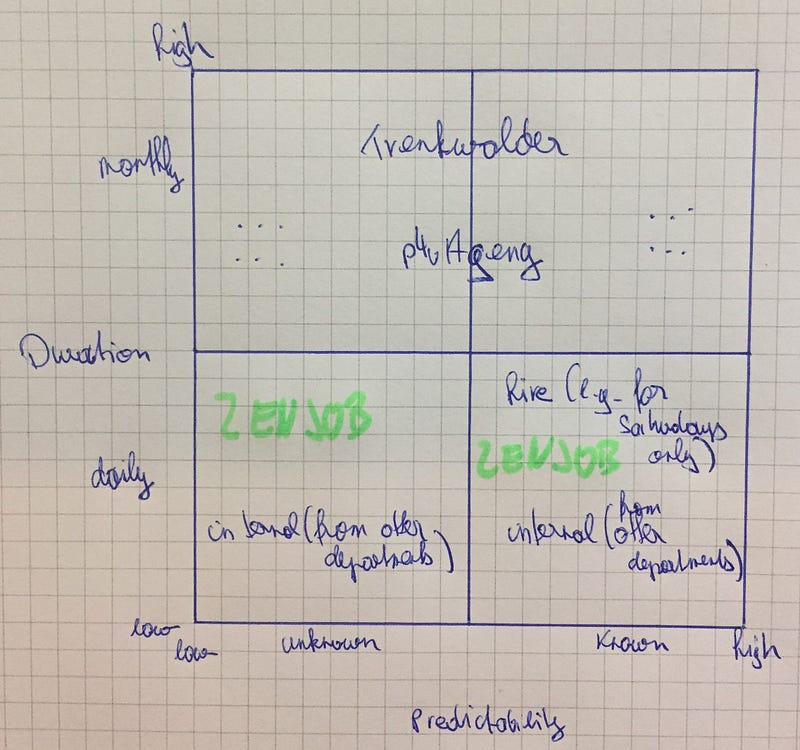ZENJOB is German startup which matches companies with temporary employee shortages with students.The company hires the students, trains them, pays them minimum wage (on average above minimum wage) and lends them to companies either for side jobs or on an hourly-basis for one-time jobs. The positions they fill are typical job students jobs such as being a waitress, doorman or handing out flyers. Job matching is usually spontaneous and they promise to find a match for companies within within 1,5 hours on average [3]. When a company needs help they contact ZENJOB who then sends out the job offer to all their students through the app. Students can then accept or decline the job through the app. ZENJOB was founded in 2015, employs 1.500 students , works with 450 companies [2] and is active in Berlin and Munich. In March they received their first investment in the amount of three million euros and a second one in September in the size of five million. With the raised money they want to expand further, amongst others, into Munich, Cologne, and Hamburg.
I find it fascinating that they not only enable hourly jobs for the mainstream but also that their lead time is only a few hours [5]. This is made possible through their underlying processes.
ZENJOB’s underlying process and lack of competition
Firstly, their matchmaking is very digital; all touchpoints (except working and initial interviewing) are digital. Also, after your first interview (with ZENJOB) all your subsequent job offers are contracted digitally through their app.
Aggregated and asynchronous application process saves time for both parties
As a student you write one application and have one job interview but get multiple jobs. This means that you submit your application and conduct the interview without a job or company in mind. ZENJOB’s aggregated and asynchronous process eliminates work for all parties. In a fictional case of five applications by one student each party saves 80% of their time when ZENJOB facilitates the hiring process (see table below).

Lack of competition
With all this talk about how great ZENJOB is, I was surprised to not find any close competitor. Lack of competition is always either because because the market is too small or because getting it done is very difficult. As you can fix a company and thus make solving the problem easier but cannot fix a market, let’s first look at ZENJOB’s potential market size.
ZENJOB is in a two-sided market. On the one demand side there are companies who have spontaneous employee shortage and on the supply side there are students who want flexible employment. Students will always exist and they will always want flexible employment. And companies have always had fluctuating workforce demands.These fluctuations can be categorized along predictability (i. e. whether the company is aware of upcoming fluctuations) and duration (how long is the fluctuation, ranging from hours and days to months and quarters). Currently, companies handle known long fluctuations (known and unknown) through temporary works and short fluctuations (known and unknown) either through workers they hire only for specific days (e. g. Saturdays), temporary support from other departments or not at all. The two categories with short durations are the ones where ZENJOB can be of biggest help.

These two categories are of course not the biggest markets, but it is as stable market and one in which ZENJOB can charge companies a premium because of their urgent demand. However, there are a few more challenges in these markets. The fact that the company planned to expand to countries (England, France…) and not just cities is evidence for these challenges.
Challenges in ZENJOB’s market: acquiring and keeping students
What makes ZENJOB’s task so difficult is that it is a marketplace where building the network is a very slow process. Firstly, acquiring the students is very repetitive. Each student has a shelf life. This means that ZENJOB’s students vanish every four years (assuming that it takes a student four years to complete her studies). However, although students’s availability fluctuates (e. g. summer breaks, or semester abroad), the probability of them leaving decreases with each job the complete because of the reputation they build (lock-in) through the ratings they receive after completing a job (that reputation is very valuable asset that ZENJOB should use for matchmaking between companies and graduates, more about that later). Furthermore, they have the trade-off between full utilization of students and short lead time. In order to enable their promised lead times ZENJOB must hire a lot of students. However, they might not be able to lend each student and thus lose the money they invested in a hiring her. This and the lock-in effect for students described above pressures ZENJOB to achieve economies of scale through employing each student as often as possible.
Challenges in ZENJOB’s market: acquiring and keeping companies
The switching costs are even higher for companies. Hiring somebody spontaneously means that they company trusts the person they are hiring. When hiring short notice it is difficult to get to know the student good enough to build trust. Because of that, companies must trust that ZENJOB will deliver. Establishing this trusting relationship takes time but once it is established and ZENJOB’s students continuously deliver as expected, companies will not switch because it takes time and money. Furthermore, in order to keep the companies as customers, ZENJOB must ensure that their employees continuosly deliver the promised quality. This monitoring is costly.
Challenges in ZENJOB’s market: geographic expansion depended on local circumstances, provides little economies of scale and legal issues as hinderances
When it comes to geographic expansion, ZENJOB is in a tough spot because they depend — in contrast to exclusively online marketplaces — on the local circumstances. If there is a lack of students or companies ZENJOB cannot even theoretically be successful. Furthermore, the dispersion of students and companies is crucial for short lead times. In an interview (in German) ZENJOB’s CEO said that whereas finding a match in Berlin’s city centre happens usually in under an hour, it takes five hours and more — if at all — for jobs on the outskirts. Related to that is that with each geographic expansion ZENJOB has to start at zero when sourcing new companies and employees. Through that, they only have limited economies of scope through expansion into more cities. In the course of analyzing goUrban, an Austrian e-scooter sharing start-up, I realized that the demand of these scooters is high in Berlin. Assuming that demand from these e-scooters also comes from students I am curios whether the growth of e-scooters and ZENJOB will correlate due to ZENJOB’s dependency on geographic reach. Legal issues (e. g. whether you can sign contracts digitally) are probably one of the reasons that slowed down ZENJOB’s international expansion.
Challenges in ZENJOB’s market: forward integration and substitution
Students and companies have alternatives. Students can rely completely on temp jobs, services such as Fiverr or look for short-term jobs through other sources (e. g. Facebook Groups). Additionally, companies can integrate forward by hiring the students.
Combating challenges through proprietary matchmaking technology
In all that it is also crucial to look at ZENJOB’s two most valuable resources, recruiting skills and matchmaking algorithms. Whereas recruiting skills easy to imitate by their competitors (a competitor only has to hire ZENJOB’s personnel) their proprietary matchmaking technology is what sets them apart. Based on the learning they have with it, their IT can be the success factor that sets them apart from others. In this context it is worth-noting that they are looking for expertise in search/Machine Learning.
Discrepancy in value proposition, excess supply and ways to combat it
What I find interesting here is the discrepancy between the value proposition towards companies and students as advertised on their website. For students they offer side and spontaneous one-time jobs but towards companies they claim to only match spontaneous one-time jobs. Maybe I am misinterpreting their communication here but they should align these value propositions. Either only spontaneous jobs or both. Offering both makes the most sense, at least theoretically. For spontaneous jobs, ZENJOB can charge a premium due to the companies’ urgency. The underlying assumption here is that ZENJOB’s negotiating power is stronger with companies that need help now, than with companies that need help in the future. However, as the supply side (students) exceeds the demand sideZENJOB has unemployed students in their pool. The fact that the start-up fills positions with a lead time of only a few hours that they are our students per company (they have 2000 students and 500 companies; there are several constraints on both figures, such as multiple job offers by one company, but for simplicity’s sake I will ignore them) are indicators for that. Considering, opportunity costs, ZENJOB must, therefore, try to employ as much students as possible because they incurr a loss through each student they hire and do not deploy (acquisition costs). This assumption that ZENJOB has excess supply implies that ZENJOB needs a way to employ all students they hire. Furthermore, bad reputation amongst students due to low unemployment and need for company growth are other reasons why ZENJOB needs a way to employ all students. The above-mentioned marketplace for side job are one way, but not the best. Firstly, the competition in marketplaces for side jobs is enormous and they have a far higher reach than ZENJOB. Secondly, companies do need a third party helping them find employees for side jobs because side jobs do not require special skills. Widening the job variety or targeting graduates are two ways ZENJOB could combat their excess supply.
Widening the job variety
The time savings made possible through ZENJOB’s aggregated and asynchronous application process are possible because the jobs share the same very well defined requirements (hard and soft skills) and company preferences do not play a role. This process can be extended to other, more complex jobs. Coding, research work or translations are three possibilities.
Targeting graduates
This is insofar interesting because in the course of an employment at ZENJOB the company regularly collects feedback about students and thus build an excellent insight into a student’s capabilities for easing further recruiting.
Notes
[2] Here ZENJOB reported to employ 2200 students but here they announced to have over 1500. Technically 2200 is more than 1500 but it is still confusing.
[3] The information about lead time is ambiguous; on their website they report three different lead times (1,5 hours, 2 hours, and 24 hours).
[5] I am biased here because as a student I tried working on the same topic but concluded that it was to difficult to realize. Thus, seeing somebody do it is fascinating.